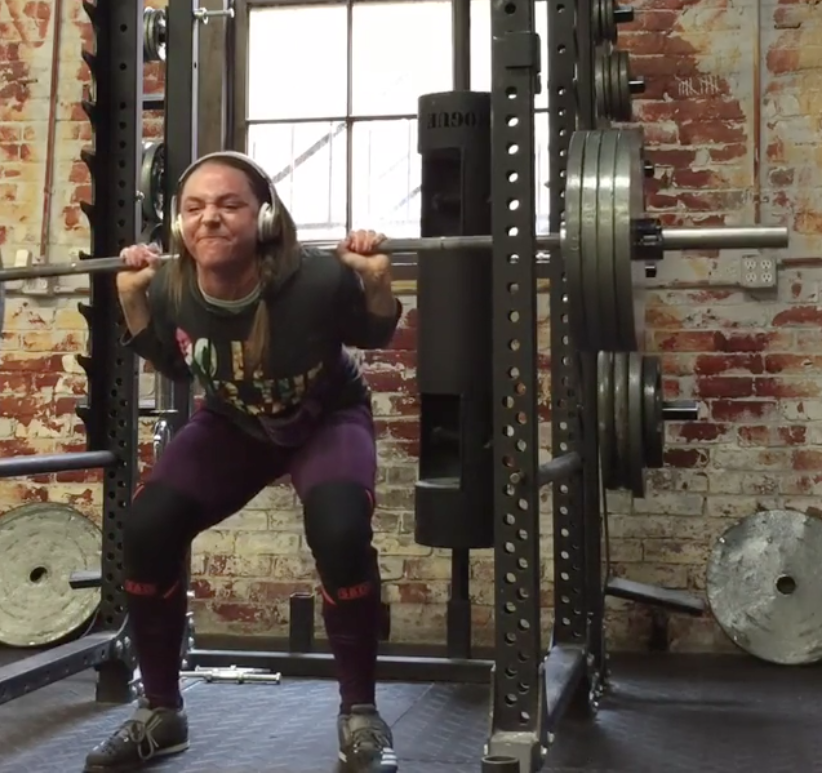Have you ever seen someone squatting 405 pounds at the gym and thought, “Wow, that’s impressive!”? Well, you’re not alone. Many people are amazed by the sheer strength and determination it takes to lift such a heavy weight. In this article, we’re going to dive deeper into the topic of squatting 405 pounds and explore whether or not it’s truly as impressive as it seems.
When it comes to squatting 405 pounds, there’s no denying that it’s a significant milestone for any weight lifter. It requires not only a tremendous amount of strength but also impeccable technique and mental focus.
Being able to handle that amount of weight puts you in a league of your own in the gym. But is it really that impressive? Well, that depends on a few factors. In the world of powerlifting, squatting 405 pounds is considered a respectable achievement.
It shows that you’ve put in the time and effort to build your strength and have reached a level where you can handle substantial loads. However, outside of the powerlifting community, opinions may vary. Some people may not fully grasp the weight and effort involved in squatting 405 pounds, while others may be blown away by the mere thought of it.
So, whether or not it’s impressive ultimately depends on the perspective of the observer. In this article, we’ll delve deeper into the world of squatting, exploring the benefits, techniques, and progressions that can help you reach new heights in your fitness journey.
So, get ready to learn more about this impressive feat and discover how you can make progress in your own strength training endeavors.

Understanding Squatting
What is squatting?
Squatting is a fundamental exercise that targets multiple muscles in the lower body, specifically the quadriceps, hamstrings, and glutes. It involves lowering oneself into a sitting position with the knees and hips bent, and then standing up again. Squatting is often performed with added weight, such as barbells or dumbbells, to increase the intensity of the exercise.
Muscles used in squatting
The main muscles used in squatting are the quadriceps, hamstrings, and glutes. The quadriceps, located at the front of the thigh, are responsible for extending the knee during the upward movement of the squat. The hamstrings, situated at the back of the thigh, play a crucial role in flexing the knees during the downward phase of the squat. The glutes, or the buttocks, assist in hip extension during both the upward and downward phases of the squat.
Benefits of squatting
Squatting has numerous benefits for both physical fitness and overall health. It is an effective exercise for building lower body strength and muscle mass. Squatting also improves balance, stability, and core strength. Additionally, squatting can help increase bone density and improve joint flexibility, making it an excellent exercise for preventing age-related conditions such as osteoporosis and arthritis. It has also been linked to improved athletic performance in activities such as running, jumping, and cycling.
The Significance of 405 Pounds
Why is 405 pounds a milestone?
In the realm of strength training, squatting 405 pounds is often considered a significant milestone. Many fitness enthusiasts and weightlifters aspire to achieve this feat due to the level of strength required to lift such a heavy load. 405 pounds represents a remarkable achievement and serves as a benchmark for evaluating one’s strength and progress.
Historical context of 405 pounds
The significance of squatting 405 pounds can be attributed to its historical context in the sport of powerlifting. Powerlifting, a strength sport that consists of three main lifts: squat, bench press, and deadlift, has long recognized the importance of reaching specific weight milestones. 405 pounds has traditionally been recognized as a weight that separates the strong from the exceptional, making it a coveted achievement among powerlifters.
Comparing with other weights
While squatting 405 pounds is undoubtedly impressive, it is important to note that strength is relative and unique to each individual. For some, squatting 405 pounds may be an incredible feat, while for others, it may be just the beginning of their fitness journey. It is essential to focus on personal progress and celebrate individual achievements rather than comparing oneself to others.

Physical and Mental Strength
Building strength through squatting
Squatting heavy weights, such as 405 pounds, is an excellent method for building physical strength. The challenge of lifting such a heavy load places significant stress on the muscles, leading to muscle fiber recruitment and growth. Over time, consistent squatting with heavy weights can result in improved muscle strength and power in the lower body.
The mental challenge of squatting 405 pounds
Squatting 405 pounds not only requires physical strength but also mental fortitude. The fear of failing or getting injured can be daunting, but overcoming these mental barriers is an integral part of achieving this milestone. It requires focus, determination, and belief in one’s abilities to lift such a substantial weight.
Training methods to reach this goal
To squat 405 pounds, a progressive training approach is necessary. This involves gradually increasing the weight lifted during squat sessions over time. Different training methods, such as linear periodization, where the intensity and volume of the workout gradually increase, can help prepare the body for lifting heavier weights. Consistency and proper technique are also crucial to preventing injuries and ensuring safe progress towards the 405-pound goal.
Personal Achievements
Individuals who have squatted 405 pounds
Several individuals have achieved the impressive feat of squatting 405 pounds. Their stories serve as inspiration and testament to the human body’s remarkable ability to adapt and grow stronger. Notable figures in the fitness community, such as professional powerlifters and bodybuilders, have shared their journeys of reaching this milestone and the impact it has had on their overall fitness and confidence.
Their stories and struggles
The stories of those who have squatted 405 pounds are diverse but share common themes of perseverance, discipline, and hard work. Many individuals faced setbacks and encountered obstacles along the way but remained dedicated to their training and goals. Their struggles serve as a reminder that progress is often nonlinear, and success is built upon the foundation of resilience and determination.
Impact on their fitness journeys
Squatting 405 pounds has had a profound impact on the fitness journeys of those who achieved this milestone. It has symbolized their commitment to personal growth and has provided a sense of accomplishment and pride. Furthermore, squatting such a substantial weight has positively influenced their overall strength and conditioning, enabling them to excel in other areas of their fitness pursuits.

Safety Considerations
Proper form and technique
Maintaining proper form and technique is paramount when squatting heavy weights. Incorrect form can lead to injuries, particularly in the knees, lower back, and hips. It is crucial to learn and practice the correct squatting technique under the guidance of a qualified professional. Engaging the core, keeping the chest lifted, and ensuring that the knees do not extend beyond the toes are essential aspects of proper squat form.
Avoiding injuries while squatting heavy
Squatting heavy weights puts significant stress on the body, increasing the risk of injury if precautions are not taken. Adequate warm-up, stretching, and mobility exercises are crucial in preparing the body for the demands of heavy squats. Additionally, listening to the body, taking rest periods, and gradually increasing the weight are effective strategies for preventing injuries associated with squatting heavy.
Qualified supervision and coaching
Working with a qualified coach or trainer can greatly reduce the risk of injuries and ensure proper technique when squatting heavy weights. They can provide valuable guidance, assess form, and offer personalized training programs tailored to one’s specific needs and goals. Having an experienced professional by your side can enhance safety and help optimize progress towards achieving the squatting 405-pound milestone.
Squatting Alternatives
Variations of squats
While traditional barbell squats are an effective exercise, there are several variations that target different muscle groups and provide alternative challenges. Front squats, goblet squats, and pistol squats are just a few examples of squat variations that can help improve overall lower body strength and add excitement to a workout routine. These variations can also help address specific weaknesses or imbalances in the lower body muscles.
Lunges and leg exercises
In addition to different squat variations, lunges and other leg exercises are effective alternatives for targeting the lower body muscles. Lunges, step-ups, and leg press exercises can all be incorporated into a fitness routine to strengthen the quadriceps, hamstrings, and glutes. By incorporating a variety of exercises, individuals can continue to challenge and develop their lower body muscles while avoiding plateaus and boredom.
Targeting different muscle groups
While squatting primarily targets the quadriceps, hamstrings, and glutes, it is important to engage other muscles as well. Supplementing squatting with exercises that target the calves, lower back, and core can help develop a more balanced lower body and improve overall strength. Exercises such as calf raises, deadlifts, and planks can be incorporated into a well-rounded lower body workout routine.

Impressions and Opinions
People’s reactions to squatting 405 pounds
The ability to squat 405 pounds often garners a range of reactions from people. Some are genuinely impressed by the display of strength and dedication, recognizing it as a remarkable achievement. Others may be skeptical or feel intimidated by the weight, perhaps comparing themselves to those who have achieved this milestone. It is important to acknowledge that everyone has their own unique fitness journey and goals, and what may be impressive to one person may not hold the same significance for another.
Social media influence
With the rise of social media, the perception of squatting 405 pounds has been heavily influenced by online fitness communities and influencers. While social media platforms can provide valuable motivation and inspiration, they can also lead to unrealistic expectations and comparisons. It is important to remember that social media highlights the highlights and achievements of others, and not every journey is accurately portrayed. Staying focused on personal progress and setting realistic goals is crucial for long-term success.
Cultural perspectives
Cultural perspectives on squatting 405 pounds can vary significantly. In some cultures, strength and physical prowess are highly regarded, making such achievements an important measure of success and social status. In other cultures, different forms of physical activity or accomplishments may hold greater significance. Cultural perspectives shape our understanding and interpretations of what is considered impressive, and it is essential to appreciate and respect these diverse perspectives.
Setting and Achieving Goals
Goal setting in fitness
Setting goals in fitness is essential for providing direction and motivation. Whether it is squatting 405 pounds or achieving any other fitness milestone, setting specific, measurable, attainable, relevant, and time-bound (SMART) goals can help individuals stay focused and track their progress. SMART goals provide a clear roadmap and enable individuals to break down their larger goals into smaller, more manageable steps.
Steps to reach a challenging goal
Reaching a challenging goal, such as squatting 405 pounds, requires careful planning and consistent effort. Breaking down the goal into manageable steps, progressively increasing weight, and training regularly are essential steps in the journey towards this milestone. Maintaining a balanced diet, prioritizing rest and recovery, and seeking guidance from fitness professionals can also greatly enhance the chances of success.
Importance of progressive overload
Progressive overload is a concept that forms the foundation of strength training. It involves progressively increasing the intensity, volume, or difficulty of an exercise over time, challenging the body to adapt and grow stronger. Applying progressive overload principles to squatting is crucial in building the necessary strength to squat 405 pounds. By gradually increasing weight, repetitions, or sets, individuals can continuously push their limits and strive towards achieving this impressive milestone.
Motivation and Inspiration
Finding motivation to squat heavy
Staying motivated to squat heavy weights can be challenging, especially when faced with obstacles and setbacks. Finding intrinsic motivation, such as the desire to improve one’s strength and physical abilities, can be a powerful driving force. Additionally, seeking external motivation, whether through inspiring success stories, supportive training partners, or visual cues, can help individuals stay focused and committed to their goals.
Inspiring success stories
The fitness community is full of inspiring success stories of individuals who have achieved remarkable feats, including squatting 405 pounds. Reading or hearing about these stories can ignite a sense of possibility and provide valuable motivation during the journey towards this milestone. It serves as a reminder that with dedication, hard work, and perseverance, anything is possible.
Creating a supportive environment
Surrounding oneself with a supportive environment and like-minded individuals can significantly impact motivation and progress towards squatting 405 pounds. Having training partners who share similar goals, joining fitness communities, or seeking the guidance of a coach or trainer can provide accountability and encouragement. A supportive environment fosters a sense of belonging and provides the necessary support to overcome challenges and achieve impressive feats.
Conclusion
Reflecting on the significance of squatting 405 pounds
Squatting 405 pounds represents a remarkable feat of strength and dedication. While it may not be attainable or impressive to everyone, it serves as a milestone for many fitness enthusiasts and weightlifters. The ability to lift such a substantial weight showcases the potential of the human body and serves as a testament to the hard work and determination required to achieve extraordinary fitness goals.
Celebrating personal achievements
It is important to acknowledge and celebrate personal achievements, regardless of how they compare to others. Squatting 405 pounds may be an impressive milestone for many, but individual progress and growth should always be the focus. Each person’s fitness journey is unique, and by setting and achieving personal goals, individuals can continue to challenge themselves and reach new heights.
The ongoing pursuit of strength
The pursuit of strength and physical accomplishment is a journey that never truly ends. Squatting 405 pounds is just one milestone along this ongoing journey. It is a reminder to challenge oneself, set ambitious goals, and continually strive for personal growth. So, regardless of whether you are impressed by squatting 405 pounds or not, the value lies in the pursuit of strength, both physically and mentally. It is a lifelong endeavor that brings countless rewards and fulfillment.




